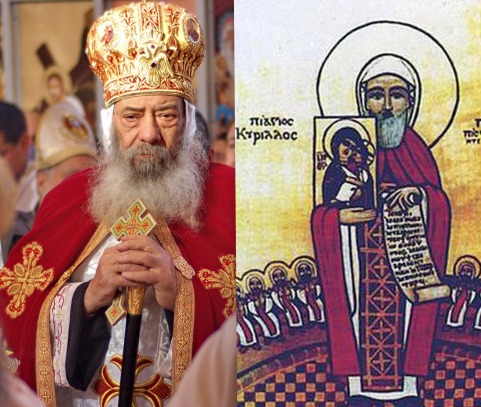“The rise of the Coptic church in ancient Alexandria coincided with the destruction of its famous library, the desecration of its amazing temples and sanctuaries, and the murder of its last philosopher, Hypatia.”
Dr. Ashraf Ezzat
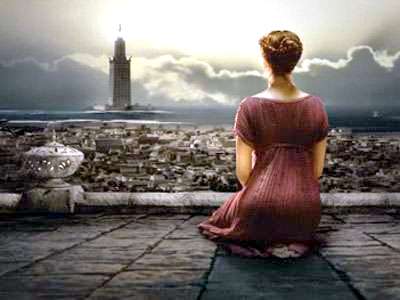
Ironically, Modern day Copts are enduring through the same persecution their early patriarchs had inflicted upon the minority of devotees of the ancient Egyptian beliefs. But now, the question is not whether history repeats itself or not, for it certainly does, rather we should wonder if man ever took notice of the recurrence?
Introduction of Christianity in Egypt
Lately, the world has begun to hear of The Copts of Egypt more often after the 2011 uprising that toppled President Hosni Mubarak and unleashed a deluge of islamists aiming for political power.
What most people know is that Egypt Copts are the Christian minority which has been suffering, in the last decade, from persecution by Egypt’s Muslim majority- or that how the media goes about it.
But the story of Egypt’s Copts remains largely unknown to the world and many of the Copts as well.
The history of Egypt is not just about the stories of the pharaohs and pyramids; rather it is the intro to the story of mankind.
Egypt’s history covers some five thousand years, and encompasses the origin of civilization, the rise of the Greeks and Romans, the establishment of the Jewish, Christian and Islamic religions and spans over the medieval ages with the crusades and conquests of the Arabs until it reaches the colonial era.
Interestingly, the origin of the name “Coptic” is derived from the word Copti. The Arabs who invaded Egypt had problems pronouncing the term, Aegypti, which means “Egyptian citizen” in Greek. Essentially, they changed the word to Copti.
Of course, at that time, Egypt was a Christian nation, so the term became limited to actual Egyptian Christians as the country became more and more Muslim. But Egypt, before the founding of Alexandria church had been embracing and maintaining for centuries the ancient Egyptian beliefs – far too sophisticated and influential to call it paganism.
The foundational roots of the Coptic Church are based in Egypt but it has a worldwide following. According to historical records, the church was established by Saint Mark the apostle and evangelist in the middle of the 1st century (approximately AD 42). The head of the Coptic Church is the Pope of Alexandria and Patriarch of All Africa on the Holy See of Saint Mark.
Egyptians enjoyed one of the richest religious cultures in ancient world. In their splendid temples prayers were offered to the creator of the universe centuries before any revelation fell unto earth from heaven. The temple of Karnak was perhaps the largest place of worship in the whole ancient world.
And if the valley of the Nile was blessed by the gods, one wonders what use did Christianity possibly have for the religious Egyptians? What were the chances of Christ to compete with the mighty Amun-ra or Osiris? How was a multi-faith environment to reconcile with a foreign religion whose followers exclusively believed in one humiliated god? … Well, This proved to be both the challenge and the tragedy for Ptolemaic Alexandria, the cosmopolitan city that combined the wisdom of Thoth and the capriciousness of Dionysus.
Pope Cyril vs. Pope Shenouda III
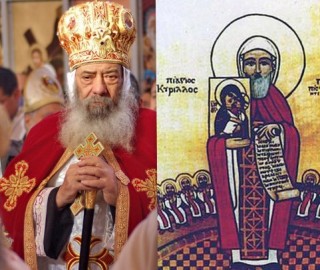
Pope Shenouda III, the 117th Pope of Alexandria and the Patriarch of the Coptic Orthodox Church of Alexandria, died on March 17 at age 88 after presiding over the largest Christian community in the Middle East for more than four decades.
He was mainly a controversial and conservative leader, upholding the church’s rigorous dogma and refusing to bend to any reform calls.
Throughout his long patriarchy Pope Shenouda III was always keen to show the church’s loyalty to the ruling regime. That is why he was striving to keep Christian youths out of Cairo’s Tahrir Square during last year’s popular uprising — the Coptic pope knew that Mubarak regime was the barrier, may be the last one, against an Islamist takeover of the country.
As the Thousands of Christian worshippers filled the somber hall of Alexandria’s St. Mark’s Cathedral and its surrounding streets for the mourning of the charismatic Pope Shenouda III, similar crowd of devout Christians, albeit newly converted from paganism, stood in the same cathedral that used to be an ancient Egyptian/Greek temple almost two thousands years earlier, exactly In 412 A.D when the infamous Pope Cyril (later St. Cyril) became patriarch of Alexandria.
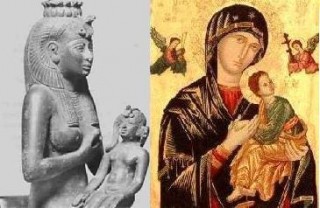
While the founding of the Alexandria church might be accredited to St. Mark the Apostle, the steadfast and inflexible orthodox doctrine of the Coptic Church is primarily attributed to pope Cyril of Alexandria (c. 376 – 444)
Before the patriarchy of Cyril, Egypt and Alexandria in particular, enjoyed a milieu of multiculturalism and tolerance as the pagans, Jews and new Christians learned to live with each others. And just as generations of Egyptians used to revere goddess Isis and her son Horus the newly converted to Christianity didn’t find it hard to relate to the story of Mary and her son Jesus.
Of all the foreign invaders of Egypt, the Ptolemies, were perhaps the only ones to acknowledge the fact that they were taking hold of a nation that had a history and a culture of no lass stature than the Greek’s.
The last days of Hypatia & Alexandria Library
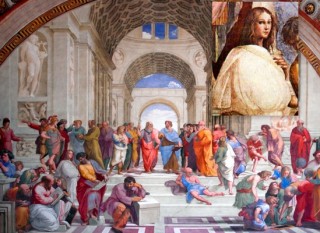
- So during the Hellenistic era in Egypt, The ancient Egyptian wisdom and deities continued to be hallowed in exaltation as more temples were being built for Egyptian gods. And In Alexandria, an ambitious plan to turn the city into the hub of all the wisdom and knowledge of the ancient world was underway as the library of Alexandria was getting ever bigger and more illustrious.
The library comprised perhaps as many as 500,000 manuscripts – the whole corpus of knowledge accumulated by ancient philosophers, scientists and poets. And it was all contained in a building thought by the ancients to have been of surpassing beauty.
From the time of its creation in the third century B.C. until its destruction seven centuries later, the library of Alexandria was the House of Wisdom and the promise of pluralism in the ancient world. One of the last generations of the library’s scholars was the legendary Hypatia.
Hypatia worked in the Library as a mathematician, astronomer, physicist and the head of the Neoplatonic School of philosophy. At a time when women had few options and were treated as property, Hypatia moved freely and unselfconsciously through traditional male domains. When empires were falling and madness prevailed she stood alone to unite the world and safeguard its sanity and wisdom.
A theological dispute in the early 5th century sparked over the nature of the Christ and whether the Virgin Mary should be called the “Mother of God” or “Mother of Jesus”.
Initiated by the unbending fundamentalist Cyril this early theological dispute led Alexandria church under his patriarchy to separate from the Roman church and start, the defiant to any reform, Coptic church in Egypt and all Africa.
Egyptians, during long centuries of the dark ages and Arab/Muslim conquest remained loyal to the faith of their fathers and to the Cyrillian fundamentalist view of Christology. That’s why the Coptic Church still keeps its ancient rituals and thoughts and upholds the same controversial practices like exorcism to deliver the sons of the church from, believe it or not, Demonic possession. (Watch the practice of exorcism in Coptic church- Video)
Cyril is a controversial figure not only because of the anathemas he pronounced against the archbishop and patriarchs of the Constantinople and Rome and not for his endorsement of expulsion of the Jews from Alexandria but because of his involvement in the abhorrent and tragic murder of the Alexandrian philosopher Hypatia by a gang of pro-Cyril Coptic monks.
At the turn of the fourth century, the growing Christian Church was consolidating its power and trying to eradicate ancient Egyptian religion and tradition. Hypatia stood at the epicenter of that mighty turn of events. Outspoken and fully aware of the perils of an impending theocracy Hypatia fearlessly declared ..
“All formal dogmatic religions are fallacious and must never be accepted by self-respecting persons as final. Fables should be taught as fables, myths as myths, and miracles as poetic fancies. To teach superstitions as truths is a most terrible thing. The mind of a child accepts them, and only through great pain, perhaps even tragedy, can the child be relieved of them.”
Archbishop Cyril despised her because she was a symbol of, free thinking, learning and science, which were largely identified by the early Church along with paganism as a great danger.
In the year 415, on her way home Hypatia was waylaid by a fanatical mob of Cyril’s parishioners and monks. They dragged her from her chariot, tore off her clothes, and armed with abalone shells, flayed her flesh from her bones. Her remains were burned, her works obliterated, her name forgotten. Afterwards and in one of history’s absurd moments, Cyril was made a saint.
[youtube Sg5m8pkzWS4 Destruction of Alexandria Library & murder of Hypatia]
To whatever part of the world you travel, to whatever page of history you turn, you find the endowed and established clergy using their holy scripture in defense of whatever form of slave-driving may then be popular and profitable- watch closely now as Islamists use Sharia law as an excuse to seize power.
The glory of the Alexandrian Library is a dim memory now. Its last remnants were destroyed soon after Hypatia’s death which marked the end of Classical antiquity and wisdom. On the other hand the rising tide of Christian fundamentalism ushered in the long dark ages that immersed millions of clueless people in endless and needless conflict and obscurantism wasting valuable centuries of the human life on earth.
Bidding farewell to Pope Shenouda III and as the thousands of modern-day Christians walked out of St. Mark cathedral in Alexandria, Mobs of Muslim fanatics watched them with eyes filled with the same menace that had before chased and wiped out the minority of devotees of the ancient Egyptian religion, in other words, the pagans.
At the turn of the second millennium A.D, one can’t help but wonder whether man grows wiser as the thousands of years go by during his long journey on earth or does he dwell in endless cycles of evanescent hope followed by recurring long ages of darkness?
The one thing we know is that the Wheels keep on turning and we keep on returning to the same spot where the library of Alexandria once stood and Hypatia murdered.
Refrences:
– Youssef Zidan’s Book ‘Azazel’
– Coptic Orthodox Church of Alexandria – Wikepedia
– Ancient Allepo Scrolls by Egyptian Monk
– Remembering Hypatia

Ashraf Ezzat is an Egyptian born in Cairo and based in Alexandria. He graduated from the faculty of Medicine at Alexandria University.
Keen not to be entirely consumed by the medical profession, Dr. Ezzat invests a lot of his time in research and writing. History of the ancient Near East and of Ancient Egypt has long been an area of special interest to him.
In his writings, he approaches ancient history not as some tales from the remote times but as a causative factor in our existing life; and to him, it’s as relevant and vibrant as the current moment.
In his research and writings, Dr. Ezzat is always on a quest trying to find out why the ancient wisdom had been obstructed and ancient spirituality diminished whereas the Judeo-Christian teachings and faith took hold and prospered.
Dr. Ezzat has written extensively in Arabic tackling many issues and topics in the field of Egyptology and comparative religion. He is the author of Egypt knew no Pharaohs nor Israelites.
He writes regularly at many well-known online websites such as Dissident Voice and What Really Happened.
Dr. Ezzat is also an independent filmmaker. His debut film was back in 2011 The Annals of Egypt Revolution and in 2012 he made Tale of Osiris a short animation for children.
In 2013 his short The Pyramids: story of creation was screened at many international film festivals in Europe. And he is working now on his first documentary “Egypt knew no Pharaohs nor Israelites”.
ATTENTION READERS
We See The World From All Sides and Want YOU To Be Fully InformedIn fact, intentional disinformation is a disgraceful scourge in media today. So to assuage any possible errant incorrect information posted herein, we strongly encourage you to seek corroboration from other non-VT sources before forming an educated opinion.
About VT - Policies & Disclosures - Comment Policy

